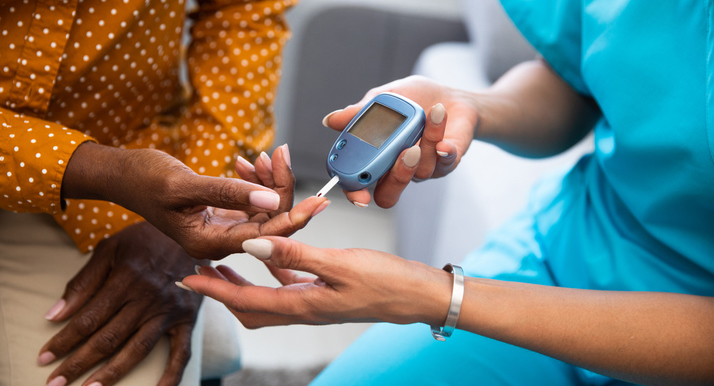Blood sugar levels: Doctor Q&A
Whether you have Type 2 diabetes, or know someone who does, being aware of what your levels of blood sugar should be and how this can affect your body, is very important. This blog is here to help you understand everything you need to know about blood sugar levels, written by our Medical Director.

What level of blood sugar is normal range?
If you have Type 2 diabetes, a normal range for your blood glucose levels is:
- before meals: 4 to 7mmol/l
- two hours after meals: less than 8.5mmol/l
If the term mmol looks a bit strange to you, don’t worry! mmol/l stands for millimoles per litre and a mole is a scientific unit often used to measure chemicals.
What are common causes of low blood sugar levels?
Low blood sugar levels, also known as hypoglycaemia or a ‘hypo’ is when your blood sugars are below 4mmol/l. It is not always known why hypos may happen, but there are some common causes that make them more likely. These include:
- Missing or delaying a meal or snack.
- Not having enough carbohydrates at your last meal.
- Doing a lot of exercise without having extra carbohydrates or without reducing your insulin dose (if you take insulin).
- Taking more insulin (or certain diabetes medication) than you need.
- Drinking alcohol on an empty stomach.
It is important that you know how to recognise a ‘hypo’ and how to treat it swiftly, as well as knowing how to prevent them in the future. For more information, read our alternative blog post.
What are common causes of high blood sugar levels?
High blood sugar levels, also known as hyperglycaemia or a ‘hyper’ is when you have a higher-than-normal amount of glucose in your blood. This is usually above 7 mmol/L before a meal and above 8.5 mmol/L two hours after a meal. Hyperglycaemia can happen because the body either cannot produce enough insulin to process the sugar in the blood or it cannot use the insulin effectively enough. Some of the common causes for hyperglycaemia are:
- You may have missed a dose of your medication.
- Have eaten more carbohydrates than either your body or medication, or both, can cope with.
- You are stressed.
- You are unwell from an infection.
- You have over-treated a hypo.
For more information on hypoglycaemia and hyperglycaemia, read our blog post; Blood Glucose Levels: Hypoglycaemia vs. Hyperglycaemia.
Do I need to monitor my blood sugar if I have Type 2 diabetes?

Not necessarily – not everyone with Type 2 diabetes needs to check their sugar levels. However, if you take certain medications, such as insulin or sulphonylureas, checking your blood sugars is a vital part of living with diabetes. By doing this, it can help you work out if you need to take more medication or when you need to eat something.
If you’re unsure about any of this, please speak with your healthcare professional and they will be able to help you with any questions you may have.
Are blood sugar levels affected by stress?
When we become stressed, our body releases two stress hormones known as cortisol and adrenaline. These hormones are what give you an energy boost for a ‘fight or flight’ response. However, these hormones can make it harder for insulin to work properly and when insulin resistance occurs, energy can’t get into your cells and therefore, your blood sugar levels rise.
Stress can also lead to overeating, which could also be a factor as to why your sugar levels rise – this in the long term can also lead to weight gain which is a known risk factor for developing Type 2 diabetes. For 9 ways to manage stress for better blood glucose control, read our blog.
If you have any further questions about any of the topics discussed above, please contact your diabetes registered healthcare professional.
—-
At Spirit Pharmacy, we’re here to help people who live with diabetes get access to their medicines, helpful items, and expert advice. We offer a friendly NHS prescription free home delivery service, alongside lots of additional services and support, especially tailored for people living with diabetes.
Please note, this article is not intended to be individual healthcare advice. Always follow specific advice relating to your condition given to you by your doctor, pharmacist, diabetic nurse, or dietician.
*Information correct at time of issue – March 2022


